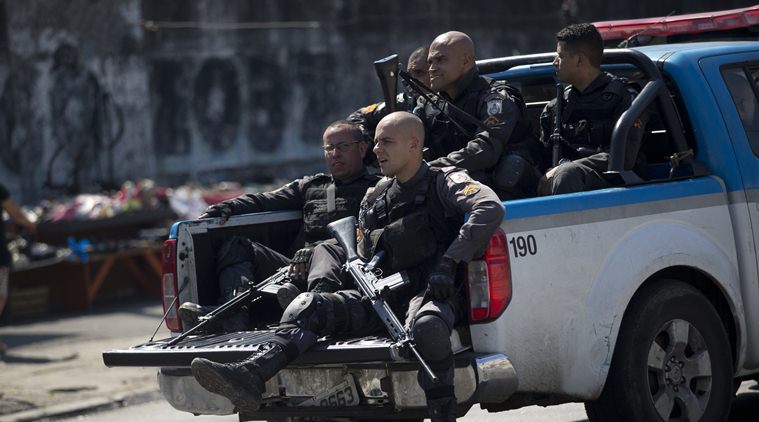Brazil: Shootouts leave 13 dead, including two soldiers in Rio de Janeiro
"Our goal is only to make arrests. If there are deaths, the criminals are to blame,'' Carlos Cinelli, a military spokesman, told reporters while adding that military personnel came under fire during operations that began at 4:30 am.

Police officers patrol the Complexo de Alemao slum during an operation in Rio de Janeiro. (Photo: AP)
At least 11 suspects and two soldiers died during shootouts with military personnel and police in greater Rio de Janeiro on Monday as violence erupted in several areas of the city that hosted the Summer Olympics two years ago. The direct confrontations between soldiers and armed traffickers also marked a deepening of the military’s role in Rio’s security. Since the military was put in charge of the state’s security earlier this year, soldiers have mostly played supporting roles to police during operations, such as securing perimeters or setting up checkpoints. On Monday, soldiers were clearly in the lead.
“Our goal is only to make arrests. If there are deaths, the criminals are to blame,” Carlos Cinelli, a military spokesman, told reporters while adding that military personnel came under fire during operations that began at 4:30 a.m. “The soldiers have a right to defend themselves.”
59s

Shootouts on the rise in Rio
Gun crime is becoming increasingly common in Rio de Janeiro due to organised crime.
Cinelli told reporters that five suspects were killed and another 10 were arrested when soldiers stormed the neighborhoods of Mare, Complexo do Alemao and Penha. In a press statement in the evening, the military command said two soldiers had died.
Cinelli said the operations, which included more than 4,000 military personnel, were aimed at finding wanted traffickers in the areas. The operation netted four pistols, two grenades and 440 pounds (200 kilograms) of marijuana paste, he said. Brazilian news site G1 reported that many residents in the areas stayed at home, skipping work and school. An Associated Press video journalist saw a public bus that had been torched close to Complexo do Alemao, possibly a response to the anti-drug operation.
Meanwhile Monday, police said they killed six suspects during confrontations in Niteroi, across the bay from Rio de Janeiro. Police said the shootouts happened while pursuing suspects on one of the access points to the bridge that joins the two cities. The bridge, one of the area’s most traversed roads, was temporarily shut. Three suspects and one police officer were injured, according to a police statement.
By decree, in February President Michel Temer put the military in charge of security in the state of Rio. He made the decision after muggings and beatings were captured on camera during Rio’s world-famous Carnival celebrations.
Human rights groups have criticized the intervention, saying it’s disproportionately impacting people, particularly blacks, in poor neighborhoods.
Cecilia Olliveira, creator of an app that tracks shootings in Brazil, sees military operations limiting favela residents’ already scarce access to public services.
“You will often hear favela residents say: We ask for education, they send police. We ask for health services, they send police,” Olliveira said. “They don’t need more police. They need government services.”













































No hay comentarios:
Publicar un comentario